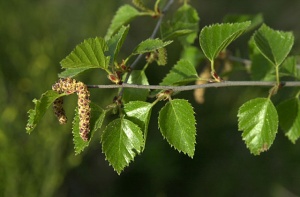Birch
From Wikiwel
Other Names: Abedul, Arbre de Sagesse, Betula, Betula alba, Betula pendula, Betula pubescens, Betula verrucosa, Betulae Folium, Biole, Bois à Balais, Boulard, Bouleau Blanc, Bouleau Odorant, Downy Birch, Sceptre des Maîtres d’École, Silver Birch, White Birch.
Birch is a tree. The leaves of the tree, which contain lots of vitamin C, are used to make medicine.
See also :
Special Precautions of Birch
- Women who are pregnant and individuals suffering from liver disease or diabetes should avoid Birch Leaf.
- White birch oil is generally non-toxic, non-irritant and non-sensitizing but should be avoided during pregnancy due to possible irritation occurring.
- Allergy to wild carrot, mugwort, celery, and spices: Birch pollen can cause allergic reactions in people who are allergic to these plants and spices. This has been called the “celery-carrot-mugwort-spice syndrome.”
- High blood pressure: There is some concern that birch leaf might increase the amount of salt (sodium) that the body retains, and this can make high blood pressure worse.
- Water pills (Diuretic drugs) interacts with BIRCH
The benefits of Birch are
Birch leaf is an excellent agent against kidney and urinary tract disorders, such as bladder infections. The anti-inflammatory and anti-bacterial properties of this herb effectively:
- Treat urinary tract infections
- Provide relief from associated discomfort
- Aid in expelling kidney and bladder stones
- Birch leaf can be brewed as a tea and, due to its diuretic properties, can effectively flush out the kidneys and bladder.
- Its anti-inflammatory properties can also bring relief to arthritis suffers.
- The health benefits of this plant also extend to alleviating dermatological ailments such as: Rashes,Warts, Hair loss, Wounds
- Studies have shown it to be effective against antibiotic-resistant infections.
- researchers are currently examining one of the compounds in birch leaf for its ability to prevent the development and inhibit the growth of skin malignancies.
- Cancer : Betulin, a substance found in the bark of the birch tree, has been shown effective in the treatment of skin cancer, respiratory syncytial virus, pneumonia and has also been tested on HIV patients. The pharmacological properties of betulin protect the liver from toxic chemicals and reduce the toxic effects of radiation and chemo therapy. It has also been claimed that in areas where birch grows or the wood is used to make household items, people have a longer life expectancy and less incidences of cancers.
- Prostate cancer : a study published in the journal Cancer Research in 2007 shows that Betulinic Acid may help protect against prostate cancer
- Skin Cancer : a study published in Clinical Cancer Research in 2003 indicates that Betulinic Acid may help fight melanoma, a less common, but more serious type of skin cancer. See also : Escharotic salves
- Birch buds have been used to treat constipation, flu, fever, colds, dizziness, allergies, circulatory and liver problems and urinary infections. For centuries, birch-based brews have been used to purge the body of poisons, cleanse the skin and strengthen the hair, the leaves to treat infections and skin ailments and the buds themselves as a remedy for those with bladder problems. And now medical research is bearing out those who over the centuries have sworn by the health benefits of birch buds. The buds are now known to contain high levels of Vitamin C, flavonoids and tannins, all of which help prevent viral infection and increase urination.
- Aromatherapy : Stimulating, soothing and warming. Instills feelings of peace and comfort.
Main Combinations
- Sprain, Strains (with Edema) : Cherry Stems + Harpagophytum + Pineapple + Birch
- Water Retention : Cherry Stems + Mouse-ear hawkweed + Birch
